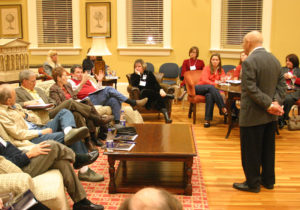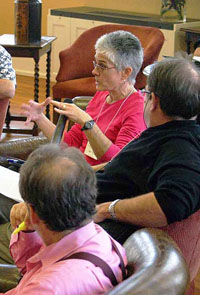
The SOPHIA Chapter Handbook released in October 2018 is available here.
The remaining information here below is likely to be archived soon, as early statements about our intentions and aims for creating local chapters.
We are in early stages of building our online presence for local SOPHIA chapters. For now, it is easy to tell you that we have established, started, or are starting chapters in: Oxford, MS’ Flagstaff, AZ; Bakersfield, CA; Minneapolis, MN; and New York, NY; and the Washington, D.C. area, among other places.
We can also share ideas about how we have been planning chapter creation for SOPHIA communities. First, visit and “like” our SOPHIA Facebook page and if you’re on Twitter, connect with us there: @SOPHIAchirp. Soon, we will have planned our process for Facebook groups that we might create, one for each chapter. Beyond these online tools, here is some information that SOPHIA officers put together to tell people about how to start a SOPHIA chapter. Please let us know what you think, as you may well help us reshape our approach for the better. We are all ears.
Starting a SOPHIA Chapter
 About SOPHIA
About SOPHIA
The Society of Philosophers in America (SOPHIA) is a non-profit organization founded in 1983 for the purpose of involving the greater public in dialogue with philosophical scholars from a variety of backgrounds. To fulfill its purpose, in 2015 SOPHIA transitioned into a chapter organization. Our local chapters will foster community building through engaged philosophical conversations. Members value and embody the virtues of civil discourse, inclusivity, and intellectual rigor. The national organization offers a framework for how to build these communities, planning resources, and opportunities to connect with other members and chapters.
Mission statement:
The mission of the Society of Philosophers in America (SOPHIA) is to use the tools of philosophical inquiry to improve people’s lives and enrich the profession of philosophy through conversation and community building.
What SOPHIA events look like

A SOPHIA event should be structured around an issue selected in consultation with the local community. In the most general terms, a SOPHIA event should begin by presenting some philosophical content or issue and modeling philosophical approaches for engaging that material. Examples could include short, 1-2 page handouts, that all participants can read prior to discussing key questions about the relevant issues. Meetings should be framed around guiding philosophical questions planned in advanced by SOPHIA chapter leaders, with an emphasis on encouraging participants to understand and express not only position regarding the issue at hand, but also reason for thinking in various ways.
The next crucial step is to invite the public to join in a dialectical exchange where they explore the chosen issue together. It is important for the SOPHIA facilitator(s) to keep the conversation focused in a philosophical direction and with a civil tone and manner, while still inviting the public to participate as much as possible. Some participants will be more eager to speak up than others, and therefore facilitators should ensure that all have an opportunity to participate. As appropriate the facilitator(s) should summarize and organize participant feedback, noting especially areas in which opposed positions may share values.
Rather than merely advocating for a particular position or having a debate, a SOPHIA event is an opportunity to delve into the reasons why people think the way they do and to use philosophy to help explore the justifications behind those reasons. SOPHIA exchanges are also opportunities for facilitators and scholars to be introduced to new ways of thinking about a philosophical problem or issue.
SOPHIA events, in general, should conclude not by solving the problem, but by giving participants resources to think more carefully about the issue in the future, and to apply the reasoning strategies they have learned to other issues. While many models for SOPHIA meetings are possible, events should minimally contain:
- A Philosophical overview and approach
- Open public discussion that is managed by a facilitator (facilitator training is available)
- A synthesis of public comments that organizes the information shared and uses philosophy to deepen the inquiry
- Offers unique opportunities to community members and scholars for mutually beneficial exchanges of ideas
- An acknowledgement to SOPHIA as a national network that builds community at the local level by promoting philosophy as a resource to enrich our daily lives.
Our membership has much experience with a wide array of events and is available for consultation with new chapters planning meetings. New chapters and meeting organizers are encouraged to review the documents and plans from past SOPHIA events, which will be made available online.
What is a SOPHIA Chapter?
As a chapter organization, SOPHIA offers structure, resources, opportunities, a network, and a set of processes and values for leading local groups interested in building communities of philosophical conversation about issues that they care about. A SOPHIA chapter involves a group of at least 3 or more chapter leaders and SOPHIA members who are each dues-paying.
Ideally at least one member of the leadership team has studied, majored in, or has completed a master’s degree or Ph.D. in Philosophy. SOPHIA chapters are meant to include people both from the academic world and from the “real world.” Chapters are also encouraged to include persons from fields of study or professions other than philosophy, as well as a diverse collection of persons who are all interested in building a community of conversation about philosophical issues that arise in life. One way SOPHIA has attracted such interest in the past has been by organizing and offering processes for SOPHIA event participants to gain continuing education credits for their careers, such as in ethics. Chapter members and leadership teams share SOPHIA’s core values: 1) Appreciating the need to build philosophical community and engagement; 2) Philosophical inclusiveness and diversity; 3) Respectful communication; and 4) Intellectual rigor in professional excellence and public relevance.
Each chapter should have a President, a Membership officer, and a Secretary, though in starting up one person can hold these roles temporarily. Groups are encouraged to have a Treasurer as well. The Membership officer should ensure that at least three members are all up-to-date as dues-paying members of SOPHIA, but also that regular participants are welcomed into membership. The President should call together and plan meetings with community members to plan events, pick topics, and find spaces for SOPHIA gatherings. He or she should organize those events or find organizers willing to chair a gathering. Organizing an event is not the same as facilitating it, so organizers should look for optimal facilitators for their topics. Facilitation assistance or training is something that the national organization can offer. SOPHIA chapters are encouraged to create advisory boards, made up of diverse members of the community, including both men and women, some scholars and others simply interested in participating in the leadership of the group. Advisory boards could gather to discuss what issues they would like their chapter to talk about over the next year or shorter term. They also can help to attract participation in SOPHIA gatherings.
The executive team for the chapter will be expected to plan and implement at least one organized, conversational gathering each year, not counting planning meetings. Chapters can host as many gatherings beyond the one required as the chapter wishes to hold. Some will choose to host one a year, one a semester, or one a month. SOPHIA’s national leadership encourages a starting point of one to three organized conversational meetings per year for new groups, who will need to gather a number of times before hosting each event. We also encourage some photography and sharing of documents and resources that were especially helpful on our online networking tools, such as on Facebook, Twitter, and our Web site.
As a general guideline, SOPHIA chapters are encouraged to obtain some form of institutional affiliation with a college or university, though it is not required. High school or community groups may benefit from such affiliations, but alternate resources and venues are also welcome.
Benefits
Benefits of Membership
As a member of SOPHIA you can:
- Join or build a local community of philosophical conversation
- Visit other SOPHIA chapters and their meetings
- Access and contribute to a set of resources for organizing SOPHIA groups and meetings
- Propose SOPHIA panels at professional gatherings, showcasing SOPHIA values
- Collaborate with other chapters and the national office in funding applications
- Participate in institutes, summer programs, or national gatherings when offered
- Partner through SOPHIA with programs like the Public Philosophy Journal
- Be recognized professionally or socially for excellence in public engagement
Chapter Benefits
As a SOPHIA chapter, your community can:
- Organize SOPHIA events with guidance for public philosophy programming
- Gain access to a collection of programming materials and models
- Affiliate with a national public philosophy organization with a 33-year history
- Partner with a network of chapters for resources and exchanges
- List your events on SOPHIA’s membership and networking sites
- Use the SOPHIA name and logo
Membership – How do I join?
Visit our Web page: http://philosophersinamerica.com to check us out and then join us in our social networking site: https://www.philosophersinamerica.com/membership-account/membership-levels/.
$10 for student members
$25 for general members
$250 for sustaining members
How do I organize a SOPHIA event?
For those thinking about starting a SOPHIA chapter, you can jump into organization or you can simply try a SOPHIA gathering first. SOPHIA events can take a number of forms, provided they strive for community building and inviting philosophical conversation. One standard example includes the following steps:
- Identify a community of people with shared interests in philosophical topics
Example: In Oxford, MS, Ex. Dir. Eric Thomas Weber contacted the university’s medical center as well as doctors, nurses, hospice care workers, and attorneys to gauge interest in “Ethics at the End of Life.” Religious leaders were also interested, and professionals joined the conversation out of interest and for the benefit of continuing education credits we offered at the event.
- Gather a team of interested organizers to share tasks and to contribute insight
- Choose one or two main facilitators for the event, who will help organize and select the content and questions
- Plan one or more meeting sessions of around 1hr and 30 minutes or less, each opening with a short, common reading that all can do in place within 3-5 minutes (a one-page case study is ideal, for example).
Example: Anonymous in JAMA, “It’s Over Debbie,” https://goo.gl/hhyIVq
- Prepare four inviting and guiding questions per session, with explanation of the philosophical content and methods for considering the material
- Choose your location and ideally affiliate with an educational institution that can support the event. You can seek funding for the event as needed, or organize on a shoestring. Affiliations with colleges and universities will offer meeting space and help organize continuing education credits for professionals. Organizing such credits are highly encouraged, but not necessary.
- Create your promotion plan. Make use of PR offices if available. Send an announcement to local newspapers. Invite people from all over, and then invite them genuinely into a two way conversation, in which you engage the public and demonstrate clearly what philosophy has to offer.
- Have a sign-up sheet! Gather names of attendees and then invite them to become members, growing your community of philosophical conversation. Then, include those people in meetings to discuss what topics they feel would be most engaging to talk about in community with others.
Growing your chapter
Let’s say you’ve started a chapter, have a President, a Membership Officer, and a Secretary, and maybe a number of other people (dues-paying members or not yet) willing to serve on your local chapter board, what next? Here are some tips for growing your SOPHIA chapter – your community of philosophical conversation.
Look for, create, or determine:
- Potential campus partners
Examples: a Philosophy or Humanities department, a Center for Ethics, an Office of Outreach, a Communications Director / Public Relations person, a person in charge of spaces, Office of Research, College of Liberal Arts, etc.
- Potential community partners, such as civic organizations or reading groups
- Funding needs, if any, and possible sources – start by talking with the national society.
- Consider revenue resources (or potential resources), such as in offering Continuing Education credits (CEU’s)
Example: Attorneys, Doctors, Nurses, Hospice care workers, therapists, teachers, and many more. Institutional affiliation is useful in part because institutions often are already setup to offer these.
- Identify media partners – Create a one-page announcement about any gatherings you organize, inviting people to participate, and distribute to a list of local and regional news outlets. Institutions often have people who can help with this.
- Marketing plan – Plan for how to be maximally attractive to potential participants and reach out to them.
- When organizing events, emphasize activities or events that are already happening or attracting attention that would be enriched by a philosophical conversation? A traveling art exhibit could inspire conversations about aesthetics or support for the arts or arts education in democratic societies.
- SOPHIA chapters affiliated with colleges and universities can request support from their institutions:
Examples: Course release(s) for leading a chapter or organizing an event, Supplemental pay for summer work, Internal grants for events and collaborations, Support for graphics, design, and printing
- Partner with other institutions – invite people from surrounding institutions to participate in your group.
- Setup a laptop at your next meeting and invite a SOPHIA officer or trustee, or a member from another town, to join your conversation or planning meeting via Skype
- Propose SOPHIA panels at local, regional, or national events to spread the word about what we do and to attract potential participants at the local level, or via video conferencing.
As your chapter grows, send the national SOPHIA leadership team updates and information. Contribute to a growing database of resources for chapters.
Thinking about Starting a Chapter or Joining SOPHIA?
Here are some questions to help you think about whether and how you could start a chapter near you:
- What are topics that are contentious or inspiring in your community?
- How can philosophical conversation empower the community?
- Who in the community would welcome philosophically driven conversations on those topics?
- Where and how could you frame a discussion on the topic in such a way that would be inviting and accessible to members of the community?
- What short readings could help participants literally to be on the same page at the initiation of a discussion?
—–
Here are some questions we ask you to help SOPHIA succeed in advancing philosophical communication:
- What best practices have you seen among chapter organizations, in terms of structure, processes, and content?
- What would make starting a SOPHIA chapter most enticing to you?
- If you are worried about the possibility of starting a SOPHIA chapter in your hometown, what concerns do you have?
- If you were not at this meeting, in what ways could SOPHIA best reach you to introduce what we do to you and your community?




